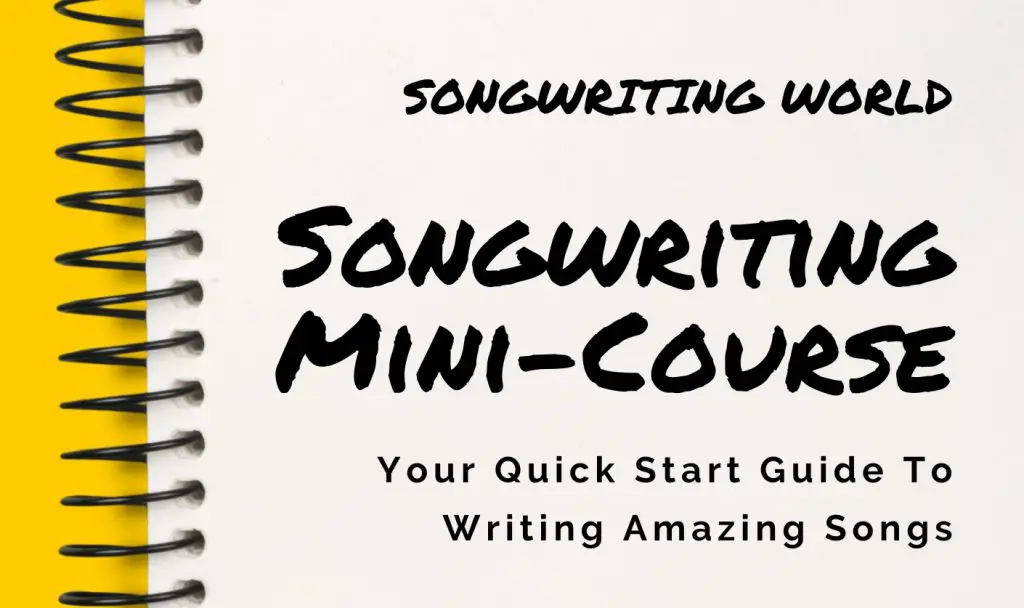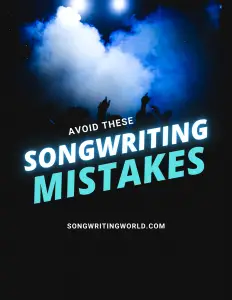

Here is a list of songwriting mistakes that songwriters should avoid in order to write better songs. The songwriting process can be difficult, and learning how to do it right takes time and practice. Knowing what not to do is just as important as knowing what to do when composing music. These songwriting mistakes are often made by all songwriters, so keep them in mind next time you’re writing a song!
Knowing what NOT to do is as important as knowing what TO DO when it comes to creating songs. We’re going to cover the peskiest problems that plague songwriters. This is a complete list of songwriting blunders, which both experienced and new writers may find useful.
 UPGRADE UNLOCKED: Would you like this post as an audiobook?
UPGRADE UNLOCKED: Would you like this post as an audiobook?
Get a FREE download of this post as a convenient ebook + audiobook.
Click here to download your book
Table of Contents
- Writing a Boring Chorus
- Your Song Sounds Too Much Like Another Song
- Not Developing Song Ideas
- Being Overly Critical Of Your Own Work
- Not Enough Practice
- Worrying Too Much About What Other People Think
- Melody Clashes with Chords
- Not Writing Enough ‘Bad’ Songs
- Trying Too Hard to be Unique
- Having no meaning in lyrics
- Writing Songs that All Sound the Same
- Trying to Write Songs for the Market instead of Yourself
- Too Many Off-key Notes that Don’t Work
- Being too repetitive
- Being Too Vague
- Not Enough Structure
- Trying to Cram too Much Story Into One Song
- Expecting to Create A Perfect Song on the First Draft
- Only Listening to One Genre or Style of Music
- Overused Rhythms and Riffs
- Creating Songs That Sound Just Like Your Influences
- Using Other’s Ideas without Making them Original
- Making All Lyrics Rhyme And Using The Same Rhyme Patterns
- Overusing clichés, phrases, and expressions
- Copying Trends and Not Creating Them
- Writing Song Intros that are Too Long
- Unusually short or long Song duration
- A Terrible Hook
- Listening Too Much To What Others Have to Say
Common Songwriting Mistakes
Writing a Boring Chorus
The songwriters who can write a great chorus are the songwriters that experience the most success. The chorus is the song’s most memorable part. You need to capture your listener’s attention soon, or you’ll lose them.
If your song is boring for them in the beginning, they won’t be motivated to listen long enough to hear your song’s climax.
Think of the chorus as the song’s last chance before they turn it off. And if they can’t get through your song’s chorus without yawning, you’re singing to some pretty distracted listeners.
Make sure you have the best chorus possible every single time!
Your song sounds too much like another song
Songwriters often make the mistake of accidentally plagiarizing another songwriter’s work. This is a songwriting mistake that can easily be avoided by being aware of what you’re writing and taking the time to compare your work to others.
There have been many famous cases where songwriters were a bit too inspired by someone else’s song. It’s easy to do, especially if a song seeps its way into your unconscious. That brilliant idea you have may have been directly inspired by something you heard somewhere else.
Make sure you’re not copying someone else’s song or melody. At the same time, always give yourself credit for your songwriting ideas.
Not developing song ideas
Many songwriters want the song to come out ready-made, every single time. This is a mistake because many great songs have been written by taking the time to develop song ideas.
Songwriters often rush their songwriting process, which can lead to incomplete or poor-quality songs. Take some time to flesh out ideas, rewrite verses, or create new melodies.
Being Overly Critical Of Your Own Work
Songwriters are often their own worst critic. This is a songwriting mistake that can be harmful to the songwriting process.
It’s important to be critical of your work, but don’t get too bogged down in the details. Songwriting is all about experimentation and trying new things. You’ll never create a great song if you’re too afraid to make mistakes.
Having high standards means you won’t settle for anything less than your best. At the same time, it’s a balancing act between being critical and being too hard on yourself.
Be critical enough to inspire your best effort, but not so harsh that it keeps you from sharing your music with the world.
Not Enough Practice
Songwriting is a craft that takes time and practice to perfect. Many songwriters make the mistake of thinking they can just sit down and write a song without any prior experience.
Sure, you could probably write a few songs right off the bat. But to develop as songwriters, we need to hone our skills through practice.
Songwriters often need to write multiple songs before they get the hang of it. Developing your own unique style is the result of writing many songs and discovering your skills and preferences.
Songwriting isn’t easy, and there’s no one-size-fits-all solution. The more you write, the better you’ll become at songwriting.
Worrying Too Much About What Other People Think
The songwriting process can be an intensely personal one. The songs you create are a unique expression. Songs are like children, and songwriters often feel protective of their songwriting ideas.
It’s important to share your music with the world; you never know whether they’ll enjoy it or not. But songwriters can make this mistake by worrying too much about what other people think about their songwriting work.
This is a tricky problem because it’s hard to find a balance between exposing your work and staying true to your own artistic vision.
Songwriters can avoid this songwriting mistake by creating music for themselves, first and foremost. Write songs that you would enjoy listening to, even if no one else ever hears them.
Music rewards original ideas and approaches. The world might not understand at first. If you follow what sounds good to you, your songwriting voice will shine through. Trust that your ideas are good and expose your music to find your audience.
Melody Clashes with Chords
Most songwriters agree that a song should have good chords and melodies. There are countless songs that are ruined because of sloppy arrangement and writing.
A song can be beautiful on paper but sound unpleasant when sung to certain chords. An example of this is adding a major seventh note to a minor chord. It might look impressive on paper, but it can sound dissonant when played.
Brilliant ideas don’t always work. It’s OK to change directions to get a better end result.
Try playing your song on several different instruments and listen carefully. Does the arrangement truly work? Is there a note in the chorus that doesn’t quite work with what the other instruments are playing? It’s okay if you have to change the chords or melodies in order for them to sound good together.
Not Writing Enough ‘Bad’ Songs
Why should songwriters write bad songs? It might seem counterintuitive, but songwriters can learn a lot from writing bad songs.
Bad songs are often the result of trying to write something that sounds good. It can be an important learning process to innovate new interesting ideas. These are songs that might not be great, but they at least show some originality.
Songwriters can avoid this songwriting mistake by having fun with songwriting and not worrying too much about the end result. Let your songwriting sessions flow, and explore different ideas without judging them right away.
The world is filled with unique songs that were inspired in a moment of madness or boredom. Even if these songs aren’t great, songwriters can learn a lot from them.
Trying Too Hard to be Unique
Trying too hard to be different is a mistake. It’s important to be yourself, and not try too hard to imitate other songwriters. The best songwriters are unique in their own way. They find their own voice by writing many songs and experimenting with different sounds and styles.
Trying to fake your uniqueness with flashy or tacky gimmicks will only distract people from the message of your music.
Songwriters can avoid this songwriting mistake by being themselves, and not trying too hard to be somebody they’re not. Make songs that sound like you, and let your personality shine through.
Having no meaning in lyrics
Write lyrics that mean something, even if it’s nonsense written for the sole purpose of having fun. It’s not enough for songwriters to just write poetry and hope it will work out as a song. A song is more than simply putting together some words; there needs to be meaning behind the song if authenticity is desired.
The best songs have an overarching idea that ties the whole song together. Take the time to express this with meaningful lyrics.
The songs that stand the test of time have one thing in common – they all have a message.
Listeners can connect to songwriters that have something they want to say, even if the song’s sound is nothing new or unique.
The world needs more songs with meaning and truth behind them. Don’t be afraid of sharing your ideas – people will appreciate it no matter how strange it might seem at first.
Writing Songs that All Sound the Same
“Same-song-itis” is how a renowned musician described it to me. “All your songs sound different, that’s good.” That simple statement stuck with me. I realized many amateur musicians are stuck in the same patterns which cause all of their music to sound the same. This
It’s an easy mistake to make. The easiest way to avoid this songwriting mistake is by being versatile and not sticking to one sound or style. Experiment with different instruments, sounds, and styles. Use different chord progressions and intentionally write songs in different keys. Listen to a variety of music and allow it to inspire your own songwriting.
Even if all your songs are great, if they all sound the same they’re easy to tune out.
Trying to Write Songs for the Market instead of Yourself
Write songs that you would want to listen to. Don’t try too hard to write what’s popular at the moment, or songwriters will end up writing exactly like everyone else.
There is no point in songwriting if all songwriters are copying each other and not using their own unique voice.
Generic pop music is guilty of this mistake. It is written to be marketable and safe. This doesn’t result in the best songwriting. Even music that became massively popular was unique and special in its time.
Frank Sinatra was radical when he first broke through. The Beatles were these strange mopheads from across the pond. The most popular mainstream bands broke through by being unique and different.
Songwriters should use their experience as songwriters to write what they want without worrying too much about whether it’s “cool” or if it will sell. If your song has something to offer, it will find an appreciative audience.
Too Many Off-key Notes that Don’t Work
Having a few off-key notes won’t kill a song. In fact, some of the most popular songs have “mistakes” that actually make the music more relatable and organic. However, being off-key can be distracting if the musicianship is a bit too off.
This usually happens when musician’s skills aren’t quite there yet. Luckily, songwriters can write great songs without being amazing musicians themselves. Other musicians can play what you wrote, after all.
However, insisting on playing every single instrument on the recording can be a mistake if it distracts people from the song itself. It doesn’t matter how good your song is; nobody wants to hear off-key singers singing out of key all throughout a song.
Trust your gut and find the right balance between doing it yourself and having others help you.
Being too repetitive
Over-relying on any one technique can make a song sound monotonous. This is especially true with song lyrics. If all the verses are sung in the same way or if all the choruses say the same thing, listeners will quickly lose interest.
This songwriting mistake can be fixed by being more intentional with song structure and chord progressions. Experiment with different harmonic ideas and structures. Come up with unique melodies for verses and choruses. Have fun with song lyrics and be more playful with words.
Being Too Vague
Being vague is a mistake that can keep people from connecting with your song. Listeners want to relate to your music in some way. By being overly vague, songwriters are preventing listeners from making that connection.
This songwriting mistake can be fixed by being more specific with song lyrics and melody. Be clear and concise with your words. Say what you mean, and mean what you say. Allow listeners to connect with your music on a personal level.
This doesn’t mean that you can’t be a bit vague, it’s simply a balancing act. Don’t be too specific or too vague, find the right balance for your song.
Not Enough Structure
A song without any structure is like a story without a plot. It’s difficult to follow and it’s easy to lose interest. Songs should have some sort of structure in order to keep listeners engaged.
It’s good to be familiar with song structures that are popular. You can know what listeners are expecting to hear.
When you know the rules, you’ll be better prepared to break them to suit your own purposes. Use existing song structures as a guideline, then deviate to create your own style.
Trying to Cram too Much Story Into One Song
Writing song lyrics that tell a story can be tricky. It’s important to try and convey the full story within one song, but not every song has enough space for this if you’re trying to cram too much into it.
Don’t force yourself to write more than what fits your song musically or lyrically. You never want to sacrifice song quality for song quantity. If your song feels too long, it probably is too long.
This songwriting mistake can be fixed by being more selective with song lyrics and melody. How can you say something with fewer words? Can you condense two verses into just one?
Know what you’re trying to say before writing the song itself, then write specifically for that message or story you want to tell!
Expecting to Create A Perfect Song on the First Draft
It’s easy to get caught up in the songwriting process. You want your song draft to be perfect, but perfection takes time and patience.
Writing a song is not only about finding that one idea or inspiration; it’s also about honing your craft as a songwriter. It can take days, weeks, months even years for songwriters to finish a song.
Don’t expect your songwriting efforts to be instantaneous! Allow the songwriting process time and work through it until you’re satisfied with what has been created.
This is how many great songs are written, not in one draft but over many drafts. Focus on enjoying the songwriting journey itself rather than its destination.
Only Listening to One Genre or Style of Music
It’s easy to get stuck in a rut by only listening to one style of music. This will limit your songwriting ability and prevent you from being influenced by other styles.
Expand your horizons by listening to different types of music. Listen to jazz, classical, rock, blues, etc. Allow yourself to be inspired by the music of other songwriters.
You never know where your next great song idea will come from, so keep an open mind when listening to music.
Overused Rhythms and Riffs
It’s easy to fall into the trap of overusing your songwriting patterns. You want to keep songwriters interested, so you may find yourself falling back on familiar rhythms or riffs that have worked in the past.
Oversaturating a song with something can be just as bad as using it too much. Once you’ve found an effective songwriting pattern, try to only use it every once in a while.
Mix up your song rhythms and riffs so that there’s always an element of surprise for the listener! Don’t rely too heavily on certain song structures or melodies.
Creating Songs That Sound Just Like Your Influences
Every now and then a certain band will get popular and inspire a wave of copycat artists. Even if that wasn’t their intention, it’s difficult to ignore. All of sudden everybody is trying to be Interpol, or Tame Impala, or the Strokes.
It’s easy to write songs that sound like your favorite songwriters, whether it’s intentional or not. But if you want to establish yourself as a songwriter in your own right and tell the world who you are through music, then don’t try so hard to be someone else.
Don’t just mimic what is popular – do something different and add to the musical moment. Write song lyrics that are unique, melodies that are catchy but not derivative, and overall songs that show your individuality.
Using Other’s Ideas without Making them Original
This songwriting mistake is closely related to the last one. When songwriters borrow other people’s ideas without making them their own, it can be easily detected by listeners.
If you’re going to use someone else’s idea, make sure that you put your own spin on it. Change the melody, change the lyrics, or change the structure. Put your own spin on it in some way.
It’s great to be inspired, but don’t let inspiration turn into carbon-copying something that someone else did. In songwriting terms, the music is your voice, so make it sound like your own.
Making All Lyrics Rhyme And Using The Same Rhyme Patterns
Rhyme is one of those tricky parts of lyric writing. It can be a great way to make lyrics more catchy and memorable, but it’s also easy to overdo it.
Some songwriters rely too heavily on rhyming, which can result in forced rhymes and monotonous song lyrics. Try not to use the same rhyme patterns throughout your entire song. Vary the types of rhymes, the song lyrics, and the rhyme patterns.
You may keep things interesting and surprise people by going against the rhyme schemes you established with your lyrics.
Overusing clichés, phrases, and expressions
Clichés are a songwriting mistake that songwriters should avoid. Sure, they can be used to create an effect or as a joke in some songs but there is no need to overuse them. Using clichés too much will make your song lyrics sound unoriginal and dull.
As soon as something is popular, songwriters start overusing it. Don’t be that guy! Be original and find creative ways to express yourself.
Instead of clichés, try using metaphors for a change. Sometimes you don’t need a lot of words to get your song message across – sometimes one well-chosen metaphor can do the job perfectly when used at just the right moment.
Copying Trends and Not Creating Them
It’s hard not to be influenced by the music around you. As songwriters, we are constantly taking in new sounds and ideas and trying to put our own spin on them.
But don’t just blindly follow what is popular right now without putting your own stamp on it. If all songwriters followed this trend, where would that leave us?
Be a trendsetter, not a follower. Create your own trends and influences. Be the change you want to see in the music world.
Writing Song Intros that are Too Long
Songwriters should avoid writing song intros that are too long. Song introductions can be a great way to set the tone for the song and introduce the listener to the main melody, but they don’t need to be excessive.
Some intros go on for way too long and never really get into the song. Keep things concise and interesting. Think about the listener’s experience the first time they hear your song. Does the intro serve the overall song? If not, don’t be afraid to cut it.
Unusually short or long Song duration
If you want your music to be marketable, keep in mind the song length that is common for your genre. If you’re going to deviate from the accepted norms, then you better have a great reason for doing so!
Unusually short song durations can be a bit jarring for listeners. They may not have time to get into the song before it’s over. On the other hand, unusually long song durations can be monotonous and boring.
Find a happy medium – something that is interesting and engaging, but doesn’t overstay its welcome.
A Terrible Hook
Your song only has once chance to make a great first impression. Make sure you have a song hook that is catchy and interesting.
A song hook should include the song title or some variation of it, as well as being easy to sing along to. It’s also important for your song hooks not be too similar – otherwise what’s going to make someone want to listen through the whole song?
Nothing beats originality. Make sure your song hooks are different and interesting. The topic of great song hooks could be a book of its own. Suffice it to say, your hook simply needs to be interesting for the listener.
If you can’t come up with a song hook, it’s better to cut the song. It’ll only get worse from there!
Listening Too Much To What Others Have to Say
A fitting conclusion to an article about songwriting mistakes is to remember that songwriting is about YOUR expression. As with any other type of art, you should be true to yourself and what you believe in.
Don’t let others dissuade you from your songwriting vision. There will always be people who are quick to criticize and offer their two cents – sometimes it’s best to just ignore them.
If you disagree with these songwriting “mistakes,” then that’s great! You should write songs how you want to and find what is right for YOU.

